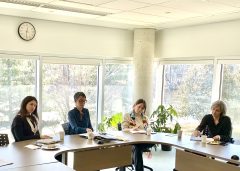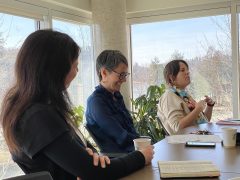On March 25, 2024, Professor Laura Madokoro from Carleton moderated the roundtable “Migration Research in the Age of Messy Politics.” Three professors from different universities shared their thoughts in the discussion. Sarah Zell from the University of Winnipeg is a feminist political geographer who researches the housing experiences of newcomers, the implications of temporary immigration status, and the ways in which labour recruiters perform state-like functions and bordering processes outside of Canada. Shauna Labman from Global College at the University of Winnipeg researches the interplay between the legal obligations of asylum and discretionary admissions, especially refugee resettlement. Megan Bradley from McGill University researches the global governance of refugees, internally displaced persons, and other forced migrants.

The panelists expressed their gratitude for the opportunity to engage in this interdisciplinary conversation, especially when the current volume of scholarly work related to forced migration makes it difficult to sustain conversations across disciplines.
The panelists first reflected on what the phrase “messy politics” means. Although “messy” does not necessarily equal “bad,” the phrase “messy politics” does acknowledge the complex and rapidly changing responses to migration.
Shauna Labman explained, “What feels messy now is a lack of clarity, blurring of classifications, and a complete absence of transparency on what the politics of migration mean for people on the move.”
She acknowledged that each of the major humanitarian movements to Canada in recent years has involved messy components: the challenge of achieving ambitious government promises in the Syrian initiative, the definition of family for Yazidi family reunification, the difficulty of getting people out of Afghanistan, and the temporary status for Ukrainians. Although migration has always been political, it is currently highly politicized in Canada, with migration coming up in election campaigns and debates between politicians at all levels. Part of Sarah Zell’s work involves showing how managed migration that is labelled as “legal, safe, and orderly” is quite messy on the ground. For example, the work of admission may be happening in a rural village in Mexico, where temporary labour migrants are recruited, long before a person arrives at the official Canadian border.
Megan Bradley emphasized that political scientists see politics and power everywhere. For her, much of the current “messiness” relates to shifting power, which can unsettle long-standing patterns of exclusion. For example, in the early years of refugee studies, there was little reflection on the predominance of privileged Western academics among authors in journals in the field. Now, the messy work is ongoing to diversify journal authorship. Another challenge with messy politics today is the strong social demand for moral clarity, with the desire to put people on one side or another of each debate. However, in reality, political issues are messy and complex. It is unrealistic to reduce migration issues and other political issues to black and white debates.
 The panelists also reflected on the ethical and practical challenges of engaging in policy debates as migration scholars. Although scholars often hope to provide evidence to guide policy in directions that are less exclusionary for migrants, in practice policy decisions often ignore research. Shauna Labman spoke about the difficulty of condensing her work into a 5-minute presentation for a politician or parliamentary committee. She often writes op-eds to make her work more accessible to readers beyond the academic community. Sarah Zell considered how the research process itself can be transformative, especially as a settler researcher engaging with the local Indigenous community.
The panelists also reflected on the ethical and practical challenges of engaging in policy debates as migration scholars. Although scholars often hope to provide evidence to guide policy in directions that are less exclusionary for migrants, in practice policy decisions often ignore research. Shauna Labman spoke about the difficulty of condensing her work into a 5-minute presentation for a politician or parliamentary committee. She often writes op-eds to make her work more accessible to readers beyond the academic community. Sarah Zell considered how the research process itself can be transformative, especially as a settler researcher engaging with the local Indigenous community.
Finally, audience members resonated with the calls to engage across disciplines, consider the end users of research, acknowledge the complexity of immigration, and recognize the opportunities and dangers of “crisis” language and “crisis” moments.
Written by Rachel McNally, LERRN Project Editor-in-Chief